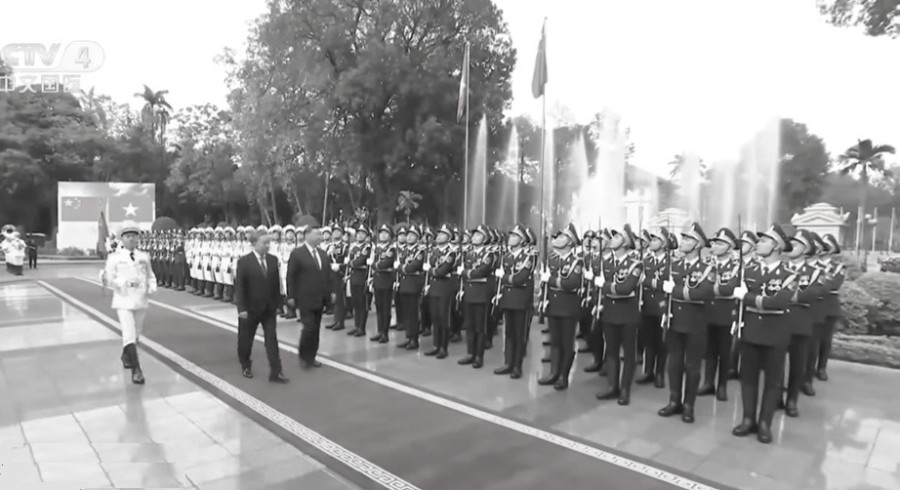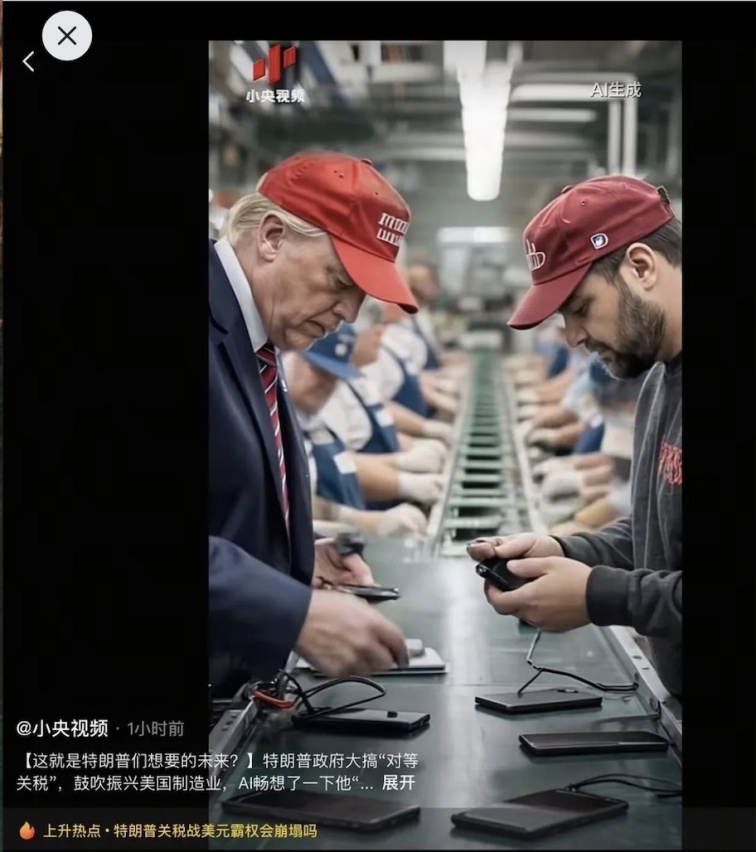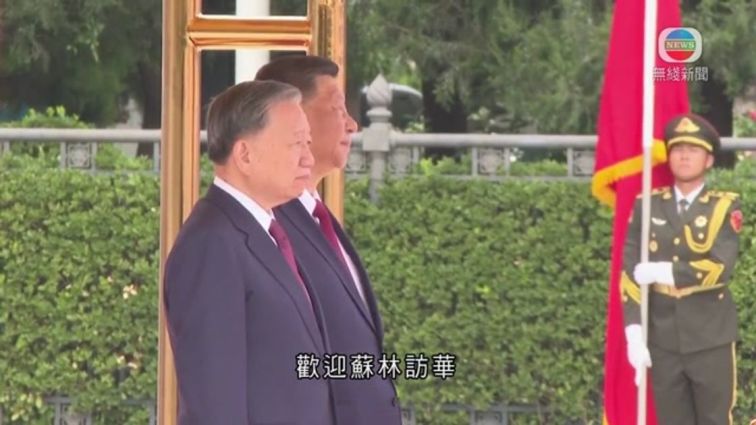On April 14, 2025, CCP leader Xi Jinping paid a state visit to Vietnam. In a video still, he can be seen walking with stiff legs and short, shuffling steps while inspecting the Vietnamese honour guard at the airport. (video screenshot)
[People News] On the 17th, the leader of the Communist Party of China (CPC) visited Cambodia, where he spoke about ironclad friendships, a community of shared destiny, strategic mutual trust, the struggle to uphold international fairness and justice, and strategic cooperation. This rhetoric mirrors his previous discussions in Vietnam and Malaysia, where he emphasised 'mountains and rivers adjacent' and 'partnerships' and 'frequent exchanges.' It seems he believes that others have forgotten the near annihilation of Vietnam during the war in the 1970s and the long-standing show of force against Malaysia in maritime disputes. Particularly in Cambodia, the Khmer Rouge, supported by Mao's Communist Party, emulated the CPC's regime by implementing the 'Great Leap Forward,' which prohibited religious beliefs, confiscated all private property, and led to widespread famine, epidemics, and the 'Great Purge' that executed a significant number of civilians, resulting in approximately 2 million abnormal deaths—about a quarter of Cambodia's total population at that time.
Now, amid the trade war with the United States, the party leader visits these countries with a smile, discussing traditional friendships with the sole aim of enticing them with benefits. This is reminiscent of the CPC's interactions with African, Latin American, and other southern nations, where they also frequently proclaim 'being like one family.'
The phrase 'being like one family' evokes a scene from a children's play where the wolf grandma approaches the sheep, always smiling and saying, 'Grandma has come to bring you something to eat.'
Of course, there are also countries that have been deceived too many times or remember their history, who confront them directly while using wisdom to counteract their tactics. For instance, Vietnam.
According to a report by Bloomberg, Vietnamese Prime Minister Pham Minh Chinh met with Jeffrey Perlman, CEO of Warburg Pincus, on April 18. He noted that there exists a "unique bond" between Vietnam and the United States, and he is currently negotiating with the Trump administration to prevent tariffs on domestic products from reaching as high as 46%.
He stressed that Vietnam has taken the initiative to lower tariffs and increase imports from the U.S., aiming to establish a "sustainable and balanced trade relationship." This relationship is described as "different from Vietnam's relations with other countries."
On the 14th, Pham Minh Chinh also warmly welcomed Xi Jinping in Hanoi. However, while Xi Jinping proposed a "joint opposition to unilateral bullying" and a community of shared future, the Vietnamese response was positive but limited to mentioning future community sharing.
The newspaper "Shangbao" highlighted that Xi Jinping's visit aimed to forge an "anti-U.S. alliance," but Vietnam is not receptive to this idea. The statement signed by both parties was vague, merely referencing "opposition to hegemonism and power politics." Vietnam has frequently employed such rhetoric in the past, often alluding to the actions of the Chinese Communist Party in the South China Sea. Commentator Tang Jingyuan remarked that Vietnam understands its economic prosperity is dependent on the U.S. rather than the Chinese Communist Party. As negotiations between Vietnam and the U.S. continue to progress, the effectiveness of the Chinese Communist Party's "charm offensive" in Southeast Asia remains uncertain.
In reality, many people in southern countries hold their own beliefs, and the state respects and protects the faith choices of all citizens, without imposing atheism on them. The fundamental irreconcilable differences between these countries and the Chinese Communist Party (CCP) stem from a clash of values, specifically the conflict between theism and atheism. However, the atheistic CCP is now trying to embrace theistic nations, akin to a wolf disguised as a grandmother attempting to befriend a flock of sheep. In the short term, this wolf grandmother may win over the little lambs with small favours to gain their trust, but once the opportunity arises, it will inevitably show its true nature and devour the lambs, much like the venomous snake in the Chinese folktale 'The Farmer and the Snake.' This behaviour is dictated by its inherent nature. Thus, countries that pursue short-term gains will ultimately forfeit their future welfare. The history of the Communist Party is replete with such examples, whether it involves aid to North Korea, its anti-Soviet stance while cooperating with Russia, conducting business with Ukraine while sending troops to support Russia's aggression against Ukraine, or leveraging Japan's invasion of China to undermine the Kuomintang while promoting anti-Japanese sentiment. These actions, marked by betrayal and ingratitude, are all aimed at strengthening the CCP's dominance in the region and even on a global scale.
In Southeast Asia, Latin America, and Africa, some countries are compromising their dignity for short-term gains, even sacrificing the rights of their own citizens to serve the leaders of the Communist Party. Some of these actions take place in countries that are anti-communist, openly violating local laws. It is not that people cannot protest against a foreign party secretary; similar to visiting a temple to pay respects or attending church services, this raises concerns for some individuals. This situation likely stems from manipulation by the Communist Party behind the scenes or direct control through officials from other nations. In recent years, party leaders visiting South Africa and Papua New Guinea have travelled with bulletproof and bombproof vehicles. Isn't this mindset peculiar? Who among foreigners would wish them harm? If there were an attempt to harm them, it would likely come from party officials, political rivals, or those close to the party leader.











News magazine bootstrap themes!
I like this themes, fast loading and look profesional
Thank you Carlos!
You're welcome!
Please support me with give positive rating!
Yes Sure!